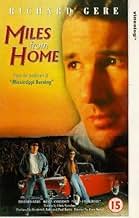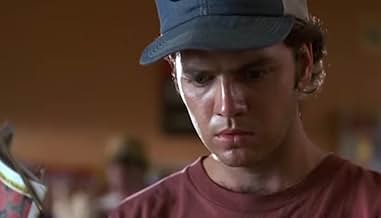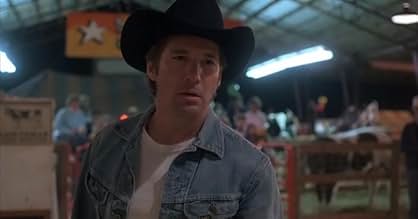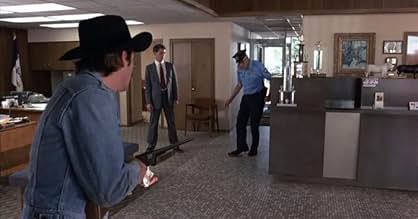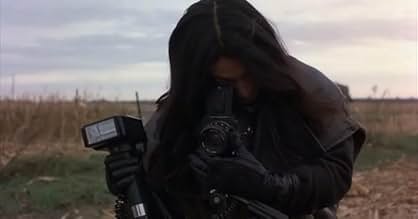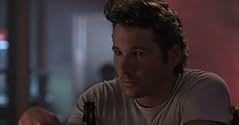NOTE IMDb
5,7/10
1,6 k
MA NOTE
Ajouter une intrigue dans votre langueTwo brothers who are forced off their farm in the debt stricken mid-west become folk heroes when they begin robbing the banks that have been foreclosing on farmers.Two brothers who are forced off their farm in the debt stricken mid-west become folk heroes when they begin robbing the banks that have been foreclosing on farmers.Two brothers who are forced off their farm in the debt stricken mid-west become folk heroes when they begin robbing the banks that have been foreclosing on farmers.
- Récompenses
- 1 nomination au total
Jason Campbell
- Young Frank
- (as Jason Campbill)
Histoire
Le saviez-vous
- AnecdotesRichard Gere turned down the lead roles in Piège de cristal (1988) and L'Arme fatale (1987) which went to Bruce Willis and Mel Gibson in order to do this film.
- GaffesWhen Frank is chatting with the cop inside the car, leaning on Terry's side of the car, the window is open. But on the next shot when the car moves and the camera pans back to Terry the window is closed.
- Citations
Frank Roberts: I don't have to make no excuses to you. People built this country.
Barry Maxwell: That's probably true, Frank. That was a long time and that country that they build just doesn't exist anymore.
- Bandes originalesLady In A Cage
Written by Maggie Mayall and Duane Sciscqua
Performed by The Maggie Mayall Band
Commentaire à la une
That's the metaphor that explains this story. Two guys started a protest, but liked their outlaw status, and didn't know when to quit.
"Miles From Home" takes a look at the life of the small-time farmer, guys who's farms were once-prosperous thirty and forty years ago, but with the price of upkeep going up faster than the price of agriculture, many have lost their farms (and homes) to corporate farm owners.
Richard Gere and Kevin Anderson are the Roberts brothers. Their father's farm is one of historical significance. As we see in the introduction, Nikita Krushcev visited the farm, which might seem unusual that a Russian leader would travel all the way to some small farm in the states. Especially given the time period, it's a wonder they didn't label Frank Roberts, Sr. (Brian Dennehy) a Communist and try to shut him down. But, apparently, Kruschev came because he admired his father's farm, voted best farm in the state that year.
It's been some time since their father died, and the sons took over the farm. Gere is the oldest boy, "Frank"; Anderson is "Terry". They have had a bad year on their farm and have yet to pay off an undisclosed number of mortgages and loans. So, the fellow from the bank comes buy to inform the brothers that they had been offered a pretty good deal for the farm, and they've agreed to sell it. Frank in particular, finds immense defeat in having the banks take over the property--the banks being a disdainful institution when you're a small town farmer in that area (we see Judith Ivey's character is the wife of a farmer who was foreclosed upon). So, Frank and Terry get the idea to burn the farm and the house down.
In that town, their arsonist protest makes them local heroes. Like I said, people don't like the lending institutions because so many have risked foreclosure. But, now the cops are after Frank and Terry because they burned the property that the bank owned, and now are risking criminal sanctions, if nothing else.
Frank and Terry take advantage of the situation, though Terry is a little more reluctant than Frank to start playing outlaw. They may have been famous at one point, even agreeing to be interviewed (by a journalist played by John Malckovich), but pretty soon--things get out hand. Frank wants to rob banks and shoot the bank representative who wanted to sell their farm. But Terry doesn't want to get involved in that any further. In fact, though fugitives, they just want to go to work on a farm again. But, they can't exactly return to the life they know. The locals were kind enough to help them get as far as they did, and it's up to Terry and Frank to decide what they'll do from there.
It's like Terry's childhood memory of himself running through the cornfields at night for so long and having so much fun before he realized he didn't know how to get back.
It's a pretty good movie, and one that is Gary Sinise's directorial debut of a feature film (he had previous director credits on three television series). Gere does do a little overacting towards the end and the movie does drag along a bit at certain points, but overall, it was a pretty good movie that makes a significant point about small farmers who are running out of options.
"Miles From Home" takes a look at the life of the small-time farmer, guys who's farms were once-prosperous thirty and forty years ago, but with the price of upkeep going up faster than the price of agriculture, many have lost their farms (and homes) to corporate farm owners.
Richard Gere and Kevin Anderson are the Roberts brothers. Their father's farm is one of historical significance. As we see in the introduction, Nikita Krushcev visited the farm, which might seem unusual that a Russian leader would travel all the way to some small farm in the states. Especially given the time period, it's a wonder they didn't label Frank Roberts, Sr. (Brian Dennehy) a Communist and try to shut him down. But, apparently, Kruschev came because he admired his father's farm, voted best farm in the state that year.
It's been some time since their father died, and the sons took over the farm. Gere is the oldest boy, "Frank"; Anderson is "Terry". They have had a bad year on their farm and have yet to pay off an undisclosed number of mortgages and loans. So, the fellow from the bank comes buy to inform the brothers that they had been offered a pretty good deal for the farm, and they've agreed to sell it. Frank in particular, finds immense defeat in having the banks take over the property--the banks being a disdainful institution when you're a small town farmer in that area (we see Judith Ivey's character is the wife of a farmer who was foreclosed upon). So, Frank and Terry get the idea to burn the farm and the house down.
In that town, their arsonist protest makes them local heroes. Like I said, people don't like the lending institutions because so many have risked foreclosure. But, now the cops are after Frank and Terry because they burned the property that the bank owned, and now are risking criminal sanctions, if nothing else.
Frank and Terry take advantage of the situation, though Terry is a little more reluctant than Frank to start playing outlaw. They may have been famous at one point, even agreeing to be interviewed (by a journalist played by John Malckovich), but pretty soon--things get out hand. Frank wants to rob banks and shoot the bank representative who wanted to sell their farm. But Terry doesn't want to get involved in that any further. In fact, though fugitives, they just want to go to work on a farm again. But, they can't exactly return to the life they know. The locals were kind enough to help them get as far as they did, and it's up to Terry and Frank to decide what they'll do from there.
It's like Terry's childhood memory of himself running through the cornfields at night for so long and having so much fun before he realized he didn't know how to get back.
It's a pretty good movie, and one that is Gary Sinise's directorial debut of a feature film (he had previous director credits on three television series). Gere does do a little overacting towards the end and the movie does drag along a bit at certain points, but overall, it was a pretty good movie that makes a significant point about small farmers who are running out of options.
- vertigo_14
- 29 mai 2004
- Permalien
Meilleurs choix
Connectez-vous pour évaluer et suivre la liste de favoris afin de recevoir des recommandations personnalisées
- How long is Miles from Home?Alimenté par Alexa
Détails
Box-office
- Montant brut aux États-Unis et au Canada
- 188 964 $US
- Week-end de sortie aux États-Unis et au Canada
- 72 872 $US
- 18 sept. 1988
- Montant brut mondial
- 188 964 $US
Contribuer à cette page
Suggérer une modification ou ajouter du contenu manquant



